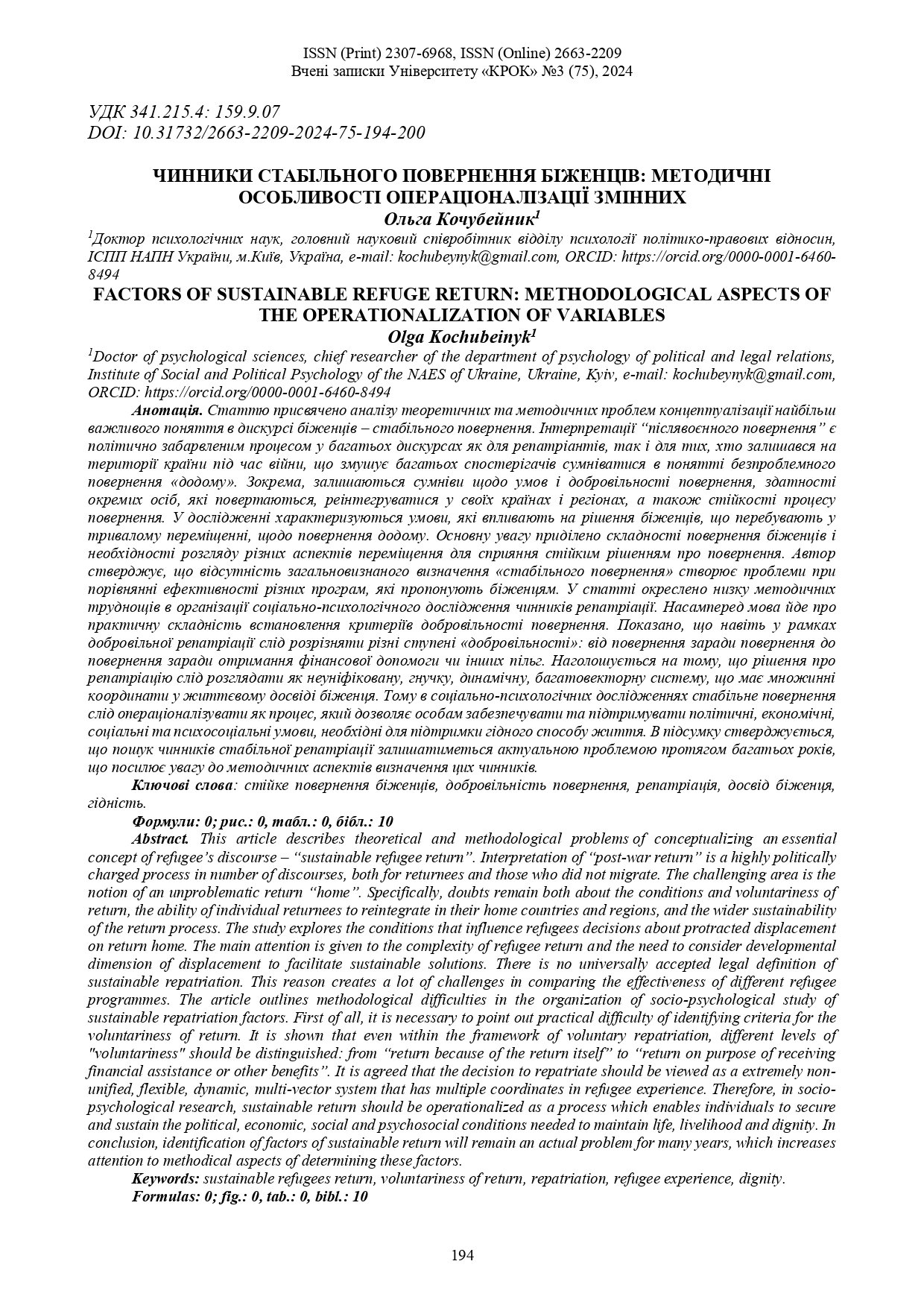FACTORS OF SUSTAINABLE REFUGE RETURN: METHODOLOGICAL ASPECTS OF THE OPERATIONALIZATION OF VARIABLES
DOI:
https://doi.org/10.31732/2663-2209-2024-75-194-200Keywords:
sustainable refugees return, voluntariness of return, repatriation, refugee experience, dignityAbstract
This article describes theoretical and methodological problems of conceptualizing an essential concept of refugee’s discourse – “sustainable refugee return”. Interpretation of “post-war return” is a highly politically charged process in number of discourses, both for returnees and those who did not migrate. The challenging area is the notion of an unproblematic return “home”. Specifically, doubts remain both about the conditions and voluntariness of return, the ability of individual returnees to reintegrate in their home countries and regions, and the wider sustainability of the return process. The study explores the conditions that influence refugees decisions about protracted displacement on return home. The main attention is given to the complexity of refugee return and the need to consider developmental dimension of displacement to facilitate sustainable solutions. There is no universally accepted legal definition of sustainable repatriation. This reason creates a lot of challenges in comparing the effectiveness of different refugee programmes. The article outlines methodological difficulties in the organization of socio-psychological study of sustainable repatriation factors. First of all, it is necessary to point out practical difficulty of identifying criteria for the voluntariness of return. It is shown that even within the framework of voluntary repatriation, different levels of "voluntariness" should be distinguished: from “return because of the return itself” to “return on purpose of receiving financial assistance or other benefits”. It is agreed that the decision to repatriate should be viewed as a extremely non-unified, flexible, dynamic, multi-vector system that has multiple coordinates in refugee experience. Therefore, in socio-psychological research, sustainable return should be operationalized as a process which enables individuals to secure and sustain the political, economic, social and psychosocial conditions needed to maintain life, livelihood and dignity. In conclusion, identification of factors of sustainable return will remain an actual problem for many years, which increases attention to methodical aspects of determining these factors.
Downloads
References
Amnesty International. (1998). Bosnia-Herzegovina: All the way home: Safe "minority returns" as a just remedy and for a second future. EUR 63/002/1998, 1 February 1998, Retrieved from https://www.refworld.org/reference/countryrep/amnesty/1998/en/91539
Black, R., Gent, S. (2006). Sustainable Return in Post-Conflict Contexts. International Migration. 44. 15–38. Doi: 10.1111/j.1468-2435.2006.00370.x.
Carvalho, S., Perkins, G., White, H. (2002). Social funds, sustainability and institutional development impacts: findings from an OED Review. Journal of International Development, 14(5), 611-625. Doi: 10.1002/jid.903
Gibson, R.B. & Hassan, Selma & Holtz, S. & Tansey, James & Whitelaw, Graham. (2013). Sustainability assessment: Criteria and processes. London, Routledge. Doi: 10.4324/9781849772716.
Global Report 2018. UNHCR, 2019. Retrieved from http://reporting.unhcr.org/sites/default/files/gr2018/pdf/ GR2018_English_Full_lowres.pdf.
Kaptein, M., Wempe, J. (2001). Sustainability management: balancing conflicting economic, environmental and social corporate responsibilities. Journal of Corporate Citizenship, 1, 91-106.
Koser, K. (2001). The return and reintegration of rejected asylum seekers and irregular migrants. Migration Research Series, no. 4, IOM, Geneva. Retrieved from https://publications.iom.int/system/files/pdf/mrs_4_0.pdf
Lawrence, J.G. (1998) Getting the future that you want: the role of sustainability indicators, in D. Warburton (Ed.), Community and Sustainable Development: Participation in the Future. Earthscan, London.
Petrin, S. (2002). Refugee return and state reconstruction: a comparative analysis. Working Paper, no. 66. Retrieved from https://www.unhcr.org/africa/media/refugee-return-and-state-reconstruction-comparative-analysis-sarah-petrin
Um, K.. (2023). Refugee Return, Reintegration, and Sustainable Futurity: Politics, Pitfalls and Possibilities of Repatriation in Post-Conflict Situations. Geopolitics. 28. 1-31. Doi: 10.1080/14650045.2023.2170787.

Downloads
Published
How to Cite
Issue
Section
License

This work is licensed under a Creative Commons Attribution-NonCommercial 4.0 International License.

